Misleading to assert foreign firms dominate Vietnam's energy sphere: expert
Vi, who has almost 20 years of experience working in the field of finance and investment credit, discussed credit financing for renewable energy initiatives, including wind and solar, at the event.
She said the spectrum of electricity investment in Vietnam could be divided into three categories: foreign investors, Vietnamese corporate entities that can arrange credit with domestic and foreign banks, and businesses that have not yet had the opportunity to arrange capital but wish to.
During 2017–2019, international investors could obtain capital inflows at a cost of around 4–5 per cent, but Vietnamese firms had to obtain capital from local banks at a cost of 11–15 per cent of total capital expenses. Therefore, local investors were pressured to invest much more than their international counterparts.
In addition, Vietnamese organisations and businesses continue to need assistance in gaining access to credit, owing to the fact that international banks do not lend to local businesses due to inadequate credit ratings. As a result, to obtain overseas loans, Vietnamese businesses will need to obtain letters of credit guarantee from Vietnamese banks.
However, only a few significant businesses in Vietnam are capable of doing so. The majority of surviving businesses will adopt the general contractor structure. With this approach, the majority of general contractors are from China, and they will offer businesses a two- to three-year wait.
According to Vi, when projects take around two years to accomplish and the state provides, it is also time for the general contractor to be paid. However, when the feed-in tariff price is not current, there is no money to reimburse the general contractor, which forces them to redirect debts while the enterprise's loans are paid off.
 |
| Hong Kim Vi, Thailand's Super Energy Group's deputy general director of public relations |
"Therefore, in the future, we should not assert that foreign companies will dominate Vietnam's electrical sector. Substance determines awareness. We do this without spending any money, and we even employ contractors. If we fail to repay the debt within two to three years, distraction is likely to occur, but is unlikely to dominate," Vi said.
Reports show that there is now an interesting trend in the merger and acquisition sector. Instead of exploring and investing in new projects in Vietnam, Vi is concerned that foreign investors from Europe, the United States, and many Asian nations would acquire and sell COD enterprises in Vietnam.
"When Vietnamese firms are cash-strapped, this is a wonderful chance. Instead of investing in new enterprises and taking risks, they will purchase at a discount if the price is pressed," she said.
Vi said that based on her job experience at Super Energy Group, that a 76-megawatt renewable power plant of this company in Thailand gets paid up to 16 cents per MWh and generates all the country's energy. Similarly, the price of power in Korea is around 9 to 10 cents.
Consequently, Vi is afraid that if Vietnam solicits international investors, those investments will be moved to other nations due to the high price of power in Vietnam relative to the opportunity cost.
Vi also said that in offline meetings of foreign investors, "they often make fun of Vietnam; why should they purchase power from Laos?"
In the meantime, many enterprises in Vietnam want to switch on power but are unable to do so. However, the price of power in Laos is around 6-7 cents, which is a little less than the price of electricity bought in the nation, which is approximately 1–2 cents.
"However, by purchasing power domestically, we are assisting Vietnamese employees in finding employment. Money is still flowing throughout our nation. When investors have surplus funds, they reinvest in the nation. In contrast, if I purchase power from other nations, we export foreign cash and create employment for their citizens," Vi said.
She believes that professionals, while calculating and planning, will determine how to make Vietnam's investment climate more appealing, attract investors, and prevent local money from leaving the country.
"It is vital to design a strategy that balances the interests of the government, businesses, and the public," she added.
Moreover, numerous comments, debates, ideas, and disappointments over the growth of renewable energy were expressed at the conference by numerous experts.
The conversation centred on tales of significant blockages in policy procedures and shortcomings in the implementation process, as well as the challenges firms face in gaining access to credit or financing.
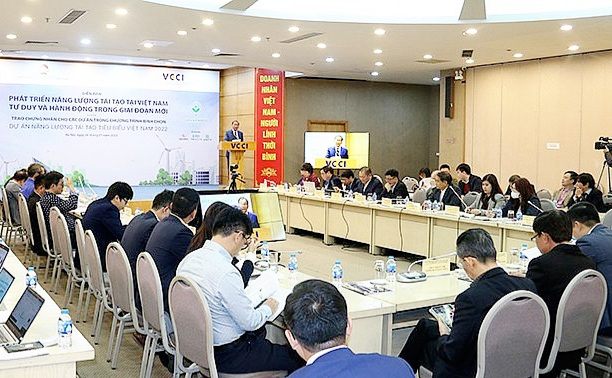 |
| The 2022 Vietnam Renewable Energy Network by VCCI |
Transitional initiatives
Regarding the pricing concerns of transitional power projects, Phan Cong Tien, a specialist in electricity and renewable energy market research, said that based on the already implemented policy, we should not compare transition projects with feed-in tariff projects. Due to the fact that transition projects will become future projects, there is no possibility to deploy them at present pricing, future projects will not have any investors.
According to Tien, the electricity price of power plants relies on two factors: the investment cost, which is the cost of creating the project's asset value, and the electricity production, which varies by area for renewable energy projects. Consequently, the crucial problem is determining how much the value of the invested assets is or if the stakeholders have a solution from which to establish the power price.
He suggests that investors employ an independent auditor to establish a project's true asset value. This asset's value will increase concurrently with production based on comparable construction and projections used to compute power costs.
Meanwhile, Tran Minh Tien, a representative of the investor in four out of 62 key transition projects, said that the entire capacity of these four projects, 160 MW, valued at approximately $300 million, was completed a few days after October 31, 2022, and has had to be halted ever since.
"With this $300 million, we have received no income for almost a year," he said, adding that other investors in 62 projects without a pricing system are in a similar scenario.
Tien said that the enterprise's investment capital had been created in large quantities, as occurs when state policy emphasises the production of renewable and clean energy. However, when it comes to execution in the real world, this could be extremely temporary.
After the policy expires, there is no longer any funding for unfinished initiatives. In reality, however, this delay is mostly because the pandemic delayed projects.
Moreover, as a project using foreign financing, this company said that there were stricter procedural requirements. For instance, clearing and compensating land might be difficult with minimal assistance from the state. Enterprises cannot conceive that the compensation and clearance costs of a project would exceed $4.26 million.
In addition, companies have had to pay extra for preservation and security after the project's completion more than a year ago, after it was halted.
"I don't know whether the equipment and machinery can work if they continue to sit and idle in the sun," Tien added.
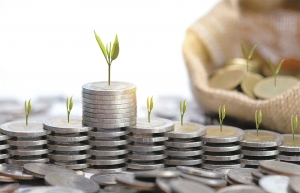 | Billion-dollar challenge begins to establish a greener Vietnam To follow suit with its previous net-zero carbon commitments and accelerate the energy transition towards green and sustainable sources, Vietnam is now making long-term planning to use public and private finance for the energy transition. |
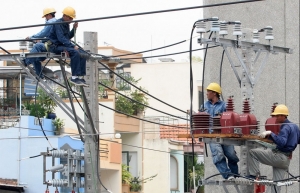 | Responsive shift required in Vietnam’s energy policy Despite improvements in energy regulations, coal-generated electricity will persist for many years to come. Dr. Ngo Duc Lam, former deputy head at the Institute of Energy under the Ministry of Industry and Trade, explained to VIR’s Van Nguyen about the country’s established and ambitious objectives for renewable energy. |
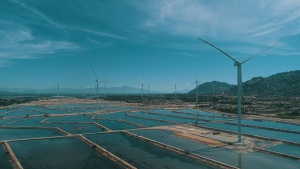 | ACEN continues to bolster renewable energy capacity in Vietnam Filipino power producer ACEN, Ayala group’s listed energy platform, continues to strengthen its renewable energy capacity in Vietnam after the company and BIM Group received financing worth $107 million. |
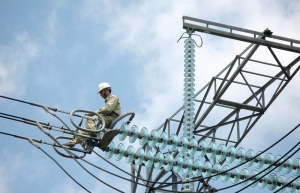 | Rising energy costs to require roadmap for businesses’ timely adjustment of strategies The Vietnamese industrial sector may need to reevaluate in order to minimise the effect of rising power costs. |
What the stars mean:
★ Poor ★ ★ Promising ★★★ Good ★★★★ Very good ★★★★★ Exceptional
Related Contents
Latest News
More News
- Bac Ai Pumped Storage Hydropower Plant to enter peak construction phase (January 27, 2026 | 08:00)
- ASEAN could scale up sustainable aviation fuel by 2050 (January 24, 2026 | 10:19)
- 64,000 hectares of sea allocated for offshore wind surveys (January 22, 2026 | 20:23)
- EVN secures financing for Quang Trach II LNG power plant (January 17, 2026 | 15:55)
- PC1 teams up with DENZAI on regional wind projects (January 16, 2026 | 21:18)
- Innovation and ESG practices drive green transition in the digital era (January 16, 2026 | 16:51)
- Bac Ai hydropower works stay on track despite holiday period (January 16, 2026 | 16:19)
- Fugro extends MoU with PTSC G&S to support offshore wind growth (January 14, 2026 | 15:59)
- Pacifico Energy starts commercial operations at Sunpro Wind Farm in Mekong Delta (January 12, 2026 | 14:01)
- Honda launches electric two-wheeler, expands charging infrastructure (January 12, 2026 | 14:00)

 Tag:
Tag:




















 Mobile Version
Mobile Version